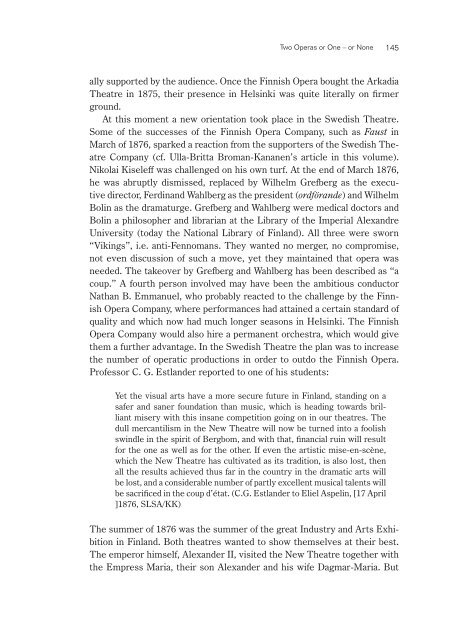Opera on the Move in the Nordic Countries during the Long 19th ...
Opera on the Move in the Nordic Countries during the Long 19th ...
Opera on the Move in the Nordic Countries during the Long 19th ...
You also want an ePaper? Increase the reach of your titles
YUMPU automatically turns print PDFs into web optimized ePapers that Google loves.
Two <str<strong>on</strong>g>Opera</str<strong>on</strong>g>s or One – or N<strong>on</strong>e<br />
145<br />
ally supported by <strong>the</strong> audience. Once <strong>the</strong> F<strong>in</strong>nish <str<strong>on</strong>g>Opera</str<strong>on</strong>g> bought <strong>the</strong> Arkadia<br />
Theatre <strong>in</strong> 1875, <strong>the</strong>ir presence <strong>in</strong> Hels<strong>in</strong>ki was quite literally <strong>on</strong> firmer<br />
ground.<br />
At this moment a new orientati<strong>on</strong> took place <strong>in</strong> <strong>the</strong> Swedish Theatre.<br />
Some of <strong>the</strong> successes of <strong>the</strong> F<strong>in</strong>nish <str<strong>on</strong>g>Opera</str<strong>on</strong>g> Company, such as Faust <strong>in</strong><br />
March of 1876, sparked a reacti<strong>on</strong> from <strong>the</strong> supporters of <strong>the</strong> Swedish Theatre<br />
Company (cf. Ulla-Britta Broman-Kananen’s article <strong>in</strong> this volume).<br />
Nikolai Kiseleff was challenged <strong>on</strong> his own turf. At <strong>the</strong> end of March 1876,<br />
he was abruptly dismissed, replaced by Wilhelm Grefberg as <strong>the</strong> executive<br />
director, Ferd<strong>in</strong>and Wahlberg as <strong>the</strong> president (ordförande) and Wilhelm<br />
Bol<strong>in</strong> as <strong>the</strong> dramaturge. Grefberg and Wahlberg were medical doctors and<br />
Bol<strong>in</strong> a philosopher and librarian at <strong>the</strong> Library of <strong>the</strong> Imperial Alexandre<br />
University (today <strong>the</strong> Nati<strong>on</strong>al Library of F<strong>in</strong>land). All three were sworn<br />
“Vik<strong>in</strong>gs”, i.e. anti-Fennomans. They wanted no merger, no compromise,<br />
not even discussi<strong>on</strong> of such a move, yet <strong>the</strong>y ma<strong>in</strong>ta<strong>in</strong>ed that opera was<br />
needed. The takeover by Grefberg and Wahlberg has been described as “a<br />
coup.” A fourth pers<strong>on</strong> <strong>in</strong>volved may have been <strong>the</strong> ambitious c<strong>on</strong>ductor<br />
Nathan B. Emmanuel, who probably reacted to <strong>the</strong> challenge by <strong>the</strong> F<strong>in</strong>nish<br />
<str<strong>on</strong>g>Opera</str<strong>on</strong>g> Company, where performances had atta<strong>in</strong>ed a certa<strong>in</strong> standard of<br />
quality and which now had much l<strong>on</strong>ger seas<strong>on</strong>s <strong>in</strong> Hels<strong>in</strong>ki. The F<strong>in</strong>nish<br />
<str<strong>on</strong>g>Opera</str<strong>on</strong>g> Company would also hire a permanent orchestra, which would give<br />
<strong>the</strong>m a fur<strong>the</strong>r advantage. In <strong>the</strong> Swedish Theatre <strong>the</strong> plan was to <strong>in</strong>crease<br />
<strong>the</strong> number of operatic producti<strong>on</strong>s <strong>in</strong> order to outdo <strong>the</strong> F<strong>in</strong>nish <str<strong>on</strong>g>Opera</str<strong>on</strong>g>.<br />
Professor C. G. Estlander reported to <strong>on</strong>e of his students:<br />
Yet <strong>the</strong> visual arts have a more secure future <strong>in</strong> F<strong>in</strong>land, stand<strong>in</strong>g <strong>on</strong> a<br />
safer and saner foundati<strong>on</strong> than music, which is head<strong>in</strong>g towards brilliant<br />
misery with this <strong>in</strong>sane competiti<strong>on</strong> go<strong>in</strong>g <strong>on</strong> <strong>in</strong> our <strong>the</strong>atres. The<br />
dull mercantilism <strong>in</strong> <strong>the</strong> New Theatre will now be turned <strong>in</strong>to a foolish<br />
sw<strong>in</strong>dle <strong>in</strong> <strong>the</strong> spirit of Bergbom, and with that, f<strong>in</strong>ancial ru<strong>in</strong> will result<br />
for <strong>the</strong> <strong>on</strong>e as well as for <strong>the</strong> o<strong>the</strong>r. If even <strong>the</strong> artistic mise-en-scène,<br />
which <strong>the</strong> New Theatre has cultivated as its traditi<strong>on</strong>, is also lost, <strong>the</strong>n<br />
all <strong>the</strong> results achieved thus far <strong>in</strong> <strong>the</strong> country <strong>in</strong> <strong>the</strong> dramatic arts will<br />
be lost, and a c<strong>on</strong>siderable number of partly excellent musical talents will<br />
be sacrificed <strong>in</strong> <strong>the</strong> coup d’état. (C.G. Estlander to Eliel Aspel<strong>in</strong>, [17 April<br />
]1876, SLSA/KK)<br />
The summer of 1876 was <strong>the</strong> summer of <strong>the</strong> great Industry and Arts Exhibiti<strong>on</strong><br />
<strong>in</strong> F<strong>in</strong>land. Both <strong>the</strong>atres wanted to show <strong>the</strong>mselves at <strong>the</strong>ir best.<br />
The emperor himself, Alexander II, visited <strong>the</strong> New Theatre toge<strong>the</strong>r with<br />
<strong>the</strong> Empress Maria, <strong>the</strong>ir s<strong>on</strong> Alexander and his wife Dagmar-Maria. But
















